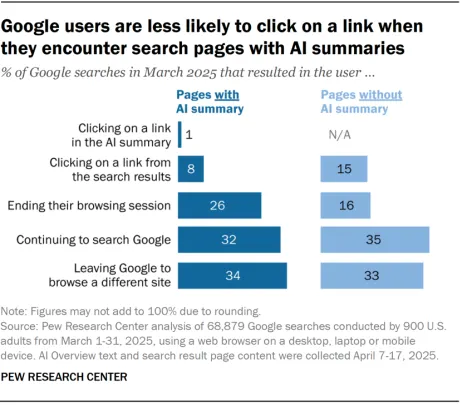
Amid varying reports suggesting that Google’s AI overviews are rapidly eroding referral traffic, Google has responded by saying that this concern is essentially being overblown, because not only are users happier with its AI overviews, it actually hasn’t seen a significant decline in total referral links being sent from Google Search results.
Which, of course, Google would say, but according to its official blog post, there’s no evidence that it’s seeing to support such claims.
Well, at least in terms of overall referral numbers.
As per Google:
“Overall, total organic click volume from Google Search to websites has been relatively stable year-over-year. Additionally, average click quality has increased and we’re actually sending slightly more quality clicks to websites than a year ago (by quality clicks, we mean those where users don’t quickly click back — typically a signal that a user is interested in the website). This data is in contrast to third-party reports that inaccurately suggest dramatic declines in aggregate traffic — often based on flawed methodologies, isolated examples, or traffic changes that occurred prior to the roll out of AI features in Search.”
Among those reports, and the one that Google’s specifically taking aim at, is a recent study published by Pew Research, which was based on search history data from a pool 0f 900 users.
Pew’s data showed that users who had encountered an AI summary in the SERP clicked on a traditional search result link in 8% of all sessions, while those who didn’t see an AI summary clicked on a search result nearly twice as often (15%).

That seems significant, and marks a significant shift in search activity, and the study has been widely quoted and held up as an example of the broader impacts of Google’s AI shift.
But Google has specifically called this one out as being based on flawed input, due to its relatively small study pool.
I mean, I guess 900 users is a small sample size, especially when you consider that billions of people are using Google every day. But as an indicative measure, the data here would likely suggest that there’s been at least some relative impact on referrals. Right?
Google says no.
“With AI Overviews, people are searching more and asking new questions that are often longer and more complex. In addition, with AI Overviews people are seeing more links on the page than before. More queries and more links mean more opportunities for websites to surface and get clicked.”
So AI previews are actually better for referral traffic, in Google’s view, and while it does concede some impact:
“For some questions where people are looking for a quick answer, like ‘when is the next full moon,’ people may be satisfied with the initial response and not click further. This has also been true for other answer features we’ve added, like the Knowledge Graph or sports scores. But for many other types of questions, people continue to click through, as they want to dig deeper into a topic, explore further or make a purchase.”
Its main contention is that while traffic is declining to some sites, it’s increasing to others, including those with forums, videos, podcasts, and posts, which are all seeing an uptick in Google traffic.
“People are also more likely to click into web content that helps them learn more — such as an in-depth review, an original post, a unique perspective or a thoughtful first-person analysis. Sites that meet these evolving user needs are benefiting from this shift and are generally seeing an increase in traffic.”
So Reddit. Reddit is seeing more traffic, and you’ve no doubt seen more Reddit links appearing in SERPs.
But still, maybe these notes provides some guidance as to what you should be including on your sites to better cater to AI previews, and evolving search behaviors. Though it’s also notable that Google hasn’t shared any specific data points to back these claims up.
Google’s just saying that it’s all fine, that you’re probably not losing traffic, and if you are, others are winning out.
So it’s all good, the broader web is better off overall. Enough with the fear mongering, right?
Well, no.
Because as noted, that still means that many sites are losing traffic, and that’s having a big impact on many businesses.
The Wall Street Journal, for example, reported back in June that organic search traffic has declined for every major news organization. Based on data provided by Similarweb, WSJ says that HuffPost’s organic search traffic has dropped by more than half over the past three years, while The Washington Post and Business Insider have seen similar patterns.
“Business Insider’s traffic from Google searches alone dropped 55% between April 2022 and April 2025, based on data from Similarweb.”
That, among other factors, forced Business Insider to cut staff by 21% back in June, citing “extreme traffic drops” as one of the challenges it’s facing.
A pessimist could say that this was opportunistic, as Business Insider is also experimenting with ChatGPT for content creation, and it may well be using this as a reason to back up its push to reduce staff. But the decline in overall traffic is undeniable, and is going to impact all businesses that make money from Google Ads and the like.
And there are various other reports:
- The Current recently reported that traffic to the world’s 500 most visited publishers dropped 27% year-over-year versus February last year
- Last month, Digiday reported that since the U.S. launch of Google’s AI Overviews in May 2024, the number of searches for news that result in no click-throughs to news websites has grown from 56% to nearly 69%
- Authoritas found that a site previously ranked first in a search result could lose about 79% of its traffic for that query if results were delivered below an AI overview.
That said, SimilarWeb, a key reference point for a lot of this type of data, has also reported that AI referrals to websites have increased by 357% since June 2024, which may support what Google’s saying about a re-distribution of Search traffic, as opposed to the top publishers taking up all the SERP space.
It’s not clear if that’ll offset the losses that are being reported, but maybe, this is indicative of Google’s statements.
Though the concern remains. Even based on Google’s explanation, many sites are indeed losing out, and will have to reassess their traffic generation process.
And with AI Overviews only currently being displayed for 20% of desktop searches, there’s also the question of what happens as Google increases this, and how that will impact the broader web.
Google says that it “cares passionately about the web ecosystem,” and that it’s very mindful of these impacts.
But right now, Google says, there’s nothing to worry about.
In overall terms, at least.
Source link




